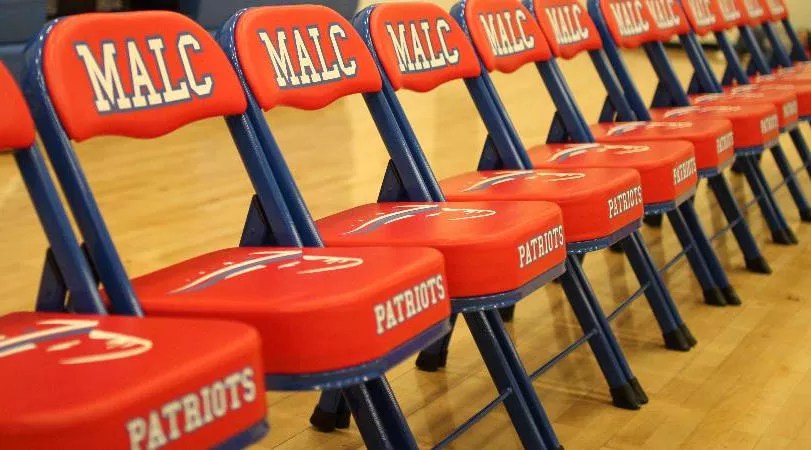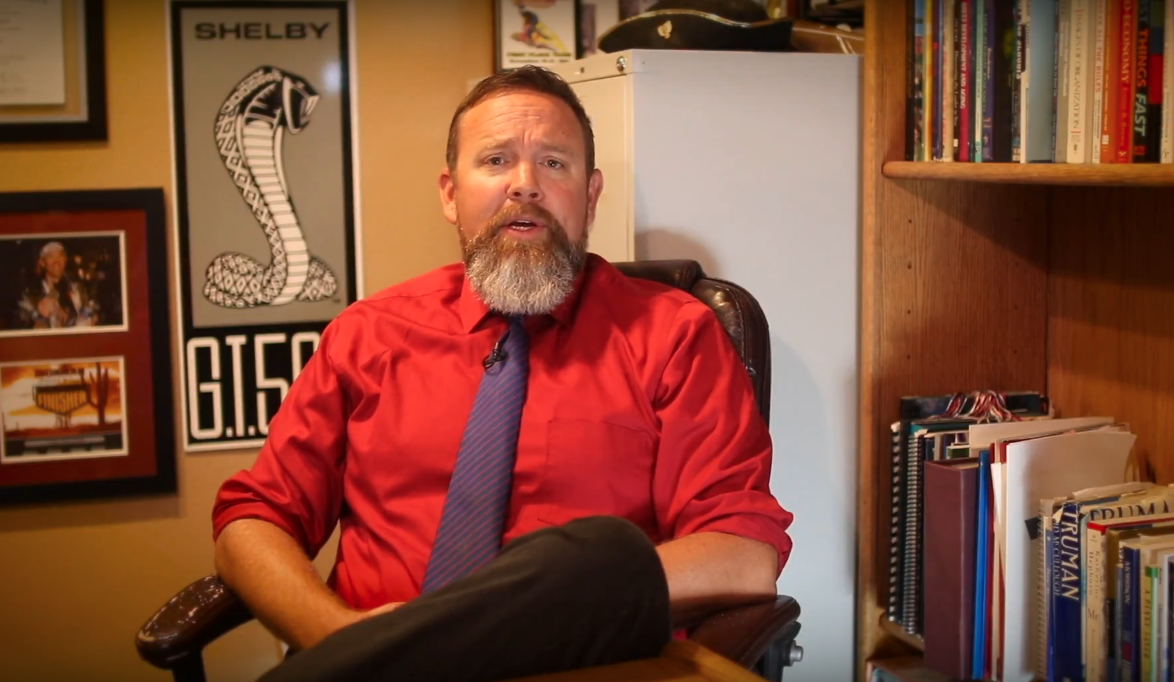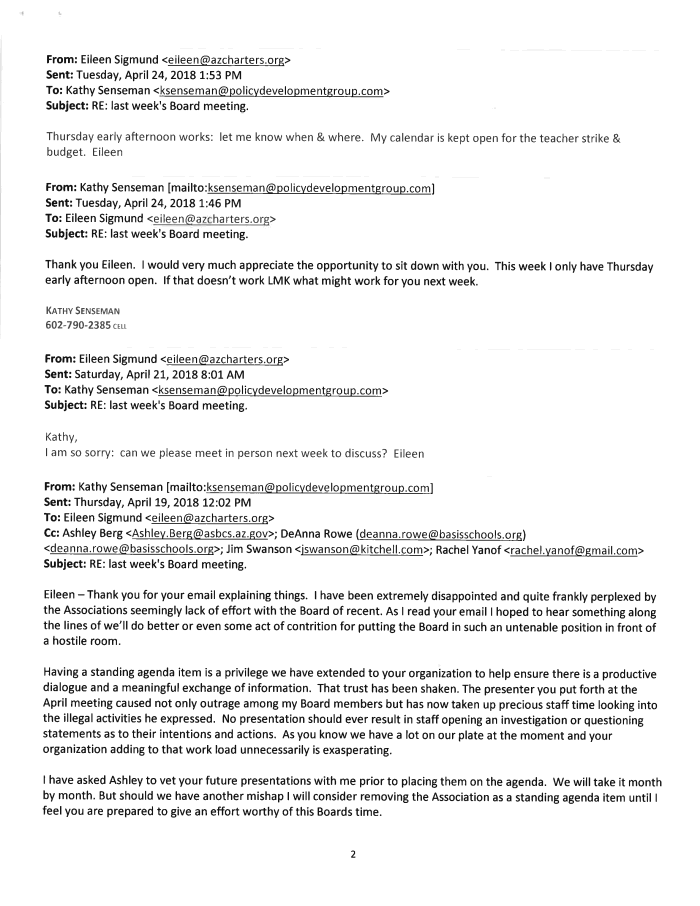

Audio By Carbonatix
Casey Mulligan’s presentation to the board that oversees Arizona charter schools was supposed to be a chance to brag about the achievements of Mohave Accelerated Schools.
Instead, during his April 9 presentation to the Arizona State Board for Charter Schools, the Bullhead City school superintendent boasted about expelling dozens of at-risk students years ago in order to change his charter school’s image.
He didn’t know his audience. Organizers with the ACLU of Arizona had packed the room, part of a campaign to push the state board on greater accountability for charter schools. Advocates seethed as Mulligan cheerfully described the same exclusionary practices the ACLU is trying to end.
“We expelled 31 students one year, and then the very next year we expelled 30 students,” Mulligan told the board. “And we kind of hit the reset button on our school.”
The charter school board investigated Mohave Accelerated Schools soon after the meeting because of Mulligan’s comments. And in a heated email exchange with the head of the Arizona charter association, the state board president said that Mulligan’s comments described “illegal activities.”
Because Mulligan attended the meeting at the invitation of the Arizona Charter Schools Association, his presentation caused the board president to harshly criticize the association, according to emails obtained by Phoenix New Times. It was a rare spat between two entities which, publicly, appear to be lockstep on charter school issues.
Mulligan has served as the superintendent of the Bullhead City charter school for four years.
As Mulligan explained to the board last spring, around 2006, the founder of Mohave Accelerated Schools wanted to transform the school into a college-prep environment. At the time, the school served many at-risk students, so the founder made “a massive change,” expelling dozens of students and raising academic expectations.
“We only took the kids who were serious about education,” Mulligan said at the meeting.
Meanwhile, advocates and parents with the Demand 2 Learn campaign were aghast at Mulligan’s comments. The campaign, a project of the ACLU of Arizona, is focused on ending discriminatory enrollment practices and disproportionate discipline at district and charter schools alike.
At the regular meetings of the charter school board that followed, advocates demanded that the board hold charter schools responsible for exclusionary practices that violate state law.
A pair of Demand 2 Learn organizers specifically called out Mulligan’s remarks during the public comment portion of the meeting.
“When the board lauds schools such as this, or practices such as this, and doesn’t ask questions, you are rubber-stamping that activity,” Melanie Young, an organizer and former charter school employee, told the board.
The charter board is often criticized for lax oversight of Arizona’s charter sector, especially when schools close abruptly because of financial mismanagement that the board was unwilling or unable to address.

Casey Mulligan, the superintendent of Mohave Accelerated Schools, seen here in a YouTube welcome message, gave a disastrous presentation to the State Board for Charter Schools last spring.
Mohave Accelerated/YouTube
According to emails obtained through a public records request, board president Kathy Senseman dressed down Arizona Charter Schools Association President Eileen Sigmund after the meeting.
One week after the meeting, Sigmund emailed Senseman to offer an explanation of what happened, but she didn’t apologize.
Sigmund wrote that Mulligan “ran amuck” during his presentation, despite more than an hour of coaching from charter association staff, which included “updating on the ACLU.”
Senseman didn’t mince words when she replied on April 19.
“I have been extremely disappointed and quite frankly perplexed by the Associations (seeming) lack of effort with the Board of recent,” Senseman wrote to Sigmund. “As I read your email I hoped to hear something along the lines of we’ll do better or even some act of contrition for putting the Board in such an untenable position in front of a hostile room.”
She explained that the board was forced to spend “precious staff time looking into the illegal activities he expressed. No presentation should ever result in staff opening an investigation or questioning statements as to their intentions and actions.”
A chastened Sigmund wrote back, “I am so sorry.” She later met with Senseman in person to smooth things over.
In an interview on Tuesday, Sigmund said that the association invited Mulligan as a representative of a high-performing rural school. He simply misspoke regarding the slew of expulsions, Sigmund said.
“What Casey presented is not the practice or a reflection of his school,” Sigmund said. “So it was surprising and not really expected, because Mohave Accelerated is doing a great job with its students, and is really doing a great job in rural education.”
In her email, Senseman threatened to remove the association’s standing agenda item from future charter board meetings until Sigmund “is prepared to give an effort worthy of this [Board’s] time,” but Sigmund says that hasn’t happened to date.
Board members were outraged by Mulligan’s comments.
In a statement on Wednesday, Senseman told New Times that she and many of the board members “were upset and we asked staff to immediately look into the matter.”
There was “a palpable tension” in the room when Mulligan spoke because of the ACLU, the board president said. She also acknowledged why the organizers had a problem with Mulligan’s comments.
“To have a charter operator present information which made it seem like the school expelled kids so that the school could become a college prep type school understandably upset many in the room,” Senseman said.
Specifically, the board feared that these students may have been expelled due to their academic performance or for other reasons prohibited by law, according to Ashley Berg, the board’s executive director.
Berg said that because of Mulligan’s presentation, board staff visited Bullhead City on April 17 to review his school’s enrollment and discipline policies. The investigation lasted a little over a month, but the board found that Mohave Accelerated Schools was not in violation of the law by May 9.
The charter school supplied information to the board to prove the expulsions were related to drug possessions on campus and related behavioral problems, according to Berg, as well as excessive absences and truancy.
“Based on the Board’s review of documentation and information provided to the Board, the expulsions appeared to be proper and not due to a student’s poor academic performance,” Berg told New Times.
“Using the word ‘expelled’ without providing some necessary context was an unfortunate choice of language [by Mulligan],” she said. “However, based on information provided to the Board during its subsequent investigation, the expulsions were found to have been handled in accordance with the law.”
The board reviewed Mohave Accelerated Schools with an eye to expulsions that took place between 2006 and 2009.
For good measure, board staff also examined the school’s most recent three fiscal years, Berg said, and found that the school’s current expulsion rate “is nowhere near where it was during the years Mulligan referenced in his presentation.”
“The expulsion rate can be characterized as very low,” she wrote. Citing privacy reasons, Berg declined to elaborate on the expulsions.
The relationship between the board and the charter association remains somewhat strained for several months after the April 9 meeting. Yet from Senseman’s point of view, there ought to be “a healthy tension” between the two entities.
“It’s what you should expect and demand between a regulatory body and any outside interest group,” Senseman told New Times. “Occasionally, the Board and the Association need to have a conversation to get things reset so we can move forward in a positive and productive way to ensure a strong and compliant charter portfolio.”
Mohave Accelerated Schools serves approximately 1,205 students in Bullhead City at two elementary schools, a middle school, and a high school.
Founder and CEO Vickie Christensen defended the 2006-07 expulsions in an interview, arguing that they were warranted.
The expulsions were always based on “fights, drugs, or some type of criminal activity,” she said.
“That’s all the expulsions we had,” Christensen said.
At the time, 90 percent of the school’s student population was eligible for free and reduced lunch students, Christensen said. “This neighborhood was very drug-entrenched,” she said. “Many of the parents were on meth.”
Christensen said that changing the school environment did not take place overnight, and required a long process of increased expectations. “You have to want to go to school here,” she said. “It’s not a play area, it’s an education institution.”
For his part, Mulligan admitted that he botched his explanation of the transformation from serving at-risk students to a college-bound population. “I didn’t paint a big enough picture, I don’t think, to describe the timeframe of a transition,” Mulligan told New Times.
So what Mulligan said at the board meeting was accurate – his school did want to become a college-prep campus, and accomplished this in part by expelling kids. Except now, Mulligan and Christensen argue that his explanation was incomplete because Mulligan left out the part about a drug crisis on campus.
And now, the state board supports Mohave Accelerated Schools, maintaining that officials expelled students for legitimate reasons.
Although he treated the board’s visit as a formal investigation, Mulligan wasn’t shocked that his comments at the meeting sparked an inquiry, he said.
“The charter board visits frequently – we go through audits like everybody else does all the time,” he said. “We are very transparent.”
Christensen was unfamiliar with the Demand 2 Learn campaign, but she said that it seemed like the ACLU’s organizers at the meeting singled out Mulligan and Mohave Accelerated Schools in a “witch hunt,” looking for “anything that he might say wrong so they could blast him.”
The charter school’s recent expulsion rate may have decreased, but talking about expelling huge numbers of kids so casually is jarring to advocates.
The lead organizer of the ACLU’s Demand 2 Learn campaign, Anabel Maldonado, said that Mulligan’s comments are a troubling example of how some charter schools push kids out.
She recalled hearing murmurs of shock when Mulligan talked about expelling students. “The room was packed that day, so I know there was some reaction from the crowd,” she said.
Excessive school discipline can contribute to lifelong consequences, especially for students of color or students with disabilities, Maldonado said. From her perspective, for Mohave Accelerated Schools to expel such a high number of students in just a few years is unacceptable.
Maldonado said, “While there was definitely outrage that they were being so upfront and open about these exclusionary practices, I think it clearly delineates the many ways in which public charters are pushing students out.”
